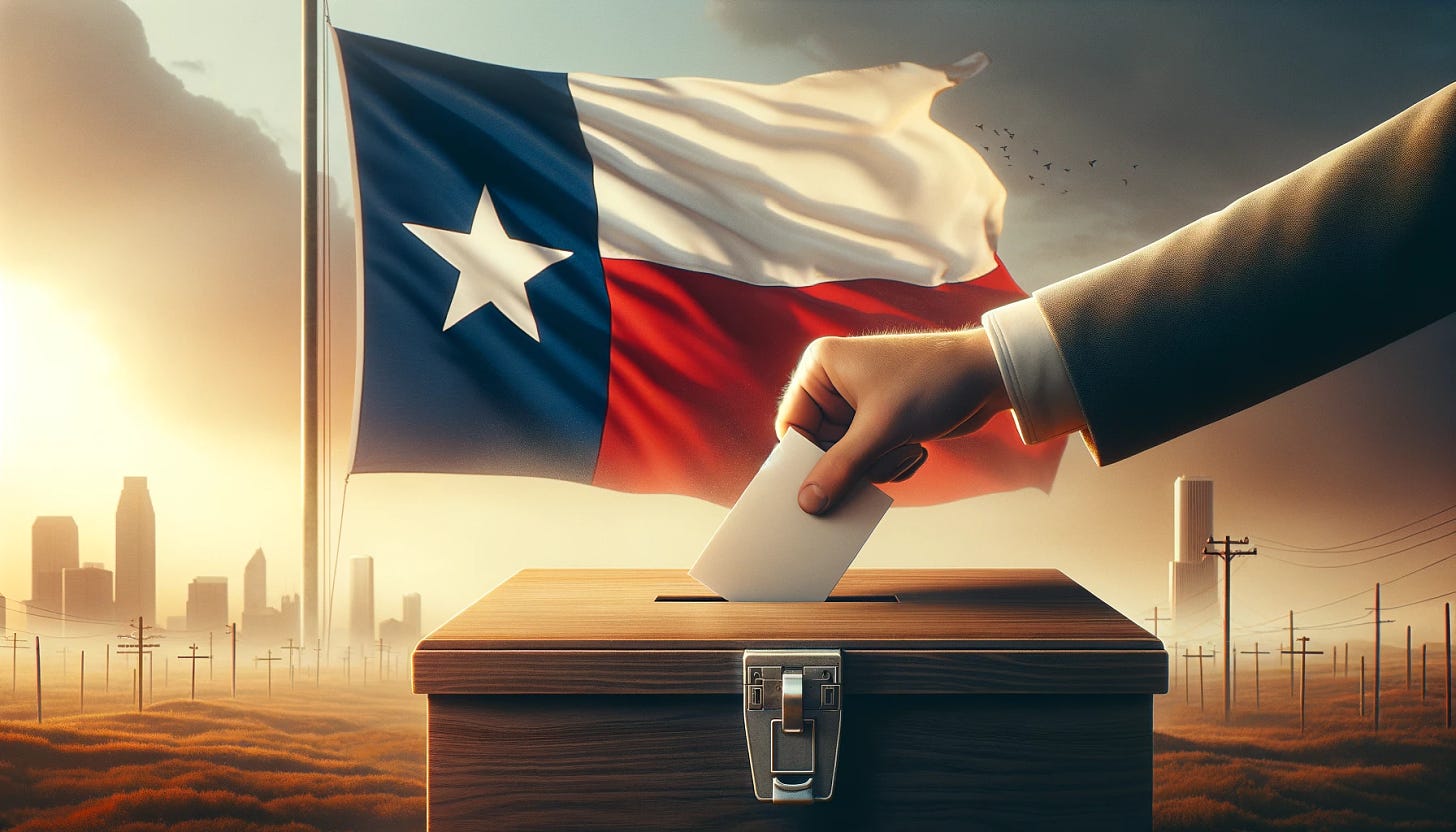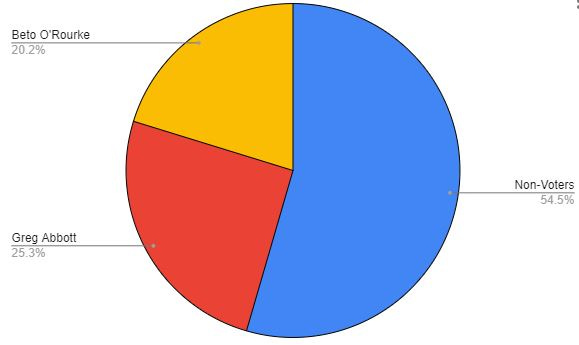The Need For A Cultural Shift: State Politics Over National Politics
Steering the Ship: How Texans can direct their political destiny.
Voter turnout in Texas is lower than any other state in the union. It’s an election year, and voter turnout in Texas this year will determine the next wave of oppressive Republican legislation those in Austin will inflict upon us. With so much at stake, one must wonder why Texans aren’t voting.
In 2022, the year after State politicians banned reproductive healthcare for women in Texas, 9.5 million registered voters stayed home.
Why?
Voter suppression? Sure. Voter apathy? Absolutely. Failing County Democratic Parties? That, too. But on top of that, too many voters neglect local politics in favor of national politics, despite the state government’s significant impact on their daily lives.
Voters aren’t entirely to blame. Media also bears much of the responsibility.
The consequences of overlooking state politics in Texas have been devastating.
State governments wield considerable power over public education, law enforcement, healthcare access, and environmental policies. In Texas, decisions made at the state level have led to significant changes in voting regulations, reproductive rights, and education. These decisions have profound and immediate impacts on Texans’ lives, far more so than most policies debated at the national level.
Since Republicans gained control of the Texas Legislature, 6 million Texans don’t have access to healthcare, one out of every five children in Texas is hungry, education funding has consistently gotten worse, our property in Texas has consistently gotten worse, LGBTQ people have lost rights, women have lost rights, immigrants have lost rights, and all of this is just the tip of the iceberg.
As Texas approaches another election cycle, the need for a shift in perspective has never been more urgent.
The local impact of State Government.
Unlike federal policies, which can feel distant and abstract, state policies have an immediate and tangible effect on residents’ lives.
Education: The Texas state government allocates funds to public schools, sets educational standards, and decides curriculum requirements. This means the difference between whether Black history is stripped from your child’s curriculum and if teachers get a pay raise.
Transportation: The state’s control over transportation policy and infrastructure development impacts daily commutes, access to services, and the economic vitality of communities. Do you want a bullet train from Dallas to Houston? Or Houston to San Antonio? Or do you want to drive through crumbling infrastructure? How about seeing a highway built through a dying town?
Healthcare: State-level decisions on healthcare policies and funding directly affect Texans’ access to medical services, the quality of care, and the affordability of health insurance. Texas’ stance on the Medicaid expansion has kept millions of Texans uninsured and sick and caused unnecessary deaths. The Texas Legislature is at fault for the closings of rural hospitals.
Civil Rights: Republicans in the Texas Legislature have spent the last several years stripping away civil rights from women, the LGBTQ community, immigrants, people of color, and the working poor. Many of those terrible bills have been overturned by federal courts. This is the Republican’s mentality: they’re going to throw every appalling piece of legislation at the wall and hope some of it sticks after the courts are done with it. And some of it does.
Given the substantial impact state governments have on these critical areas, it’s clear that the decisions made in Austin reverberate throughout Texas, influencing the day-to-day experiences and long-term prospects of its residents. The stakes of state-level elections are incredibly high, with the power to shape educational outcomes, healthcare accessibility, infrastructure quality, law enforcement, and public safety across the state.
Texas Democrats are nothing like DC Democrats.
Of all of the most important points, Texas Democrats are nothing like the Democrats we see on the national stage. Texas Democrats in the Legislature have more fights, more grit, and don’t give up as quickly.
Texas has a solid cultural identity that emphasizes individualism, which can influence the political leanings of its residents, including Democrats. If you’ve followed me on social media during the last few legislative sessions, you know I’m constantly posting videos of Democratic Legislators handing Republicans their ass.
For example, when Representative Jarvis Johnson embarrassed Carrie Isaac:
Side note: So many people love Jasmine Crockett (me included). Y’all have to remember that she served in the Legislature first. She learned how to handle Republican stupidity from handling Texas Republicans first.
Unfortunately, too many Texans don’t even know what state House or Senate District they are in. (If you don’t know, you can find out here.)
It’s just as important, if not more important, to know who your state legislators are than your Congressperson. They do far more to impact your daily lives than anyone in Washington, DC.
Your voice carries more weight in a state election than a national one.
This is due to the smaller electorate size for these races, meaning each vote has more potential to influence the election’s outcome.
For the presidential election, your vote is one in 161 million.
For the governor election, your vote is one in 17 million.
For your State Senator, your vote is one in 940,000.
For your Congressperson, your vote is one in 766,000.
For your State Representative, your vote is one in 195,000.
Engagement in state politics thus becomes not just an act of civic duty but a direct means of shaping the community and state in which you live. When fewer people turn out to vote in these elections, it results in a governance that may not accurately reflect the populace’s will.
This dissonance can lead to policies misaligned with the community’s needs and values, which we’re seeing now. The majority of Texans know that the Texas government doesn’t align with the needs and values of Texans. This is a result of such low turnout in our elections.
This means that getting involved in state politics is not only a way to exert influence on the direction of the state but also a means to safeguard their rights and ensure that their interests are represented. As Texas approaches another critical election cycle, the need for informed and engaged participation in state politics has never been more critical.
How do we change Texas from the culture of not voting, and how do we get voters to pay attention to what happens in Austin?
That’s the 20 million dollar question. Changing the culture of voter engagement in Texas, mainly focusing on state politics, requires targeting both the root causes of voter apathy and the barriers to participation.
One of the primary reasons people don’t vote is a lack of understanding about how significantly state politics impacts their daily lives. Launching widespread education and awareness campaigns can help bridge this gap. This doesn’t always have to come from the State Party. County parties or grassroots organizations can do this as well.
These campaigns could use social media, traditional media, and community events to highlight the direct effects of state legislation on healthcare, education, civil rights, and more. By clarifying these connections, Texans may feel more compelled to participate in elections.
Of course, it would really help if Congress passed the John Lewis Voting Rights Act. Maybe they will one day. Until then, we need to flip the state legislature to address voter suppression issues. Democrats have the numbers to do that, but they must show up.
Civic engagement shouldn’t just peak during election cycles. Encouraging year-round involvement in local issues—through town halls, community forums, and local advocacy groups—can keep people invested in the political process. Engaged citizens are more likely to vote and to encourage others to do the same.
Vote early, vote often, just fucking vote.
Important 2024 primary RUNOFF election days:
April 29, 2024: Last day to register to vote.
May 17, 2024: Last day to apply by mail
May 20, 2024: First day of early voting.
May 24, 2024: Last day of early voting.
May 28, 2024: Last day to receive a ballot by mail.
May 28, 2024: Election day.
LoneStarLeft’s Newsletter is a reader-supported publication. To receive new posts and support my work, consider becoming a free or paid subscriber.
Follow me on Facebook, Twitter, TikTok, Threads, YouTube, and Instagram.






Excellent reporting........i would add a coupe of comments
in my own state house and senate races we simply have no candidates who campaign.
That is not my fault.
one reason for the cohesiveness of R's is that they hang in gangs, church in paticular, but there are few civic orgs that aren't MAGAtized...dissent and they kick u out....
i once belongeed to Fort Worth Fly Fishers*.....ur thinking fly fisherman,,,got a be a bunch of pinko enviros...nope the potentates were Tea Party..i was quickly shown the door..so i assume bowling teams.
sofball teams,etc are similarly dominated by MAGAites.........even in the n'hood Dems are afraid to put up signs cause their neigbors will ostracize them.
this is not a concession on my part........hit back.............so what if ur neighbors shun u.......did u really want to be their pals?
*kinda of a funny story.....FWFF organized an event on the Llano River.....a waterway owned and managed by the LCRA....and camped in Mason City Park.....another socialist org...........that night around the campfire they were all winging about governtment and Obama...the usual Tea Party claptrap....i chimed in: "I vote for Barach.....I was toast......the president went so far a to call me a communist.......i explained I actually owned one of Texas oldest business........mattered not...............do u think any who weren't Tea Party, and there were a few, came to my defense. Hell no! Lots of D's and I's are simply limp noodles.
Hood County Dems: they know how to express themselves, thus engaging voters. Supreme Kudos folks.
i recieved this as email and don't know how to link to so will cut and paste the email.
"Hi tim, I’m Adrienne Quinn Martin, the Chair of the Democratic Party of Hood County.
Last week, I shared a truly chilling video of a meeting in Granbury -- attended by several Republican elected officials -- in which a spokesman from Abolish Abortion Texas (AATX) called for the death penalty for women who seek abortions or use IVF, including pregnant minors. Many extremist Republican elected officials and candidates have already pledged to make this dark vision of the future for Texas women a reality. Rural Texas areas like Hood County are the frontlines in the fight against fundamentalist MAGA extremists like this, tim -- where they feel free and emboldened to share their dangerous views publicly:
Paul Brown (AATX Director of Policy) said that IVF is a form of abortion and that when a fertilized egg is destroyed it should be considered murder, saying “Their lives [women] don’t matter any more than the babies’ they are killing.”
Brown also said how the group is against basic contraception pointing to the emergency contraception pill Plan B, saying that it “terminates or kills a baby prior to implantation -- which is an abortion”
Brown went on to say that they will “never be okay with abortions in the instance of incest or rape” with several audience members suggesting that pregnant women and doctors who perform abortions should be “held accountable” to the highest extent of the law.